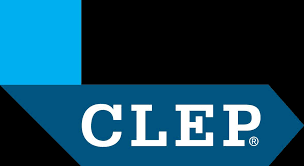The College Level Examination Program (CLEP) is the most widely accepted college credit-by-examination program in the United States. While Advanced Placement (AP) courses are usually taken by above-average students, CLEP exams benefit average and non-traditional, adult education students.
CLEP gives individuals the opportunity to demonstrate college-level knowledge that they’ve gained through prior course work, independent study, professional experience, and other pursuits. The student receives course credit, course exemption, and/or advanced placement in a degree program. High scores on CLEP exams can earn students as much as two year’s worth of college credits.
Benefits of the CLEP Program
Administered by the College Board for over 50 years, CLEP offers 34 exams that
allow students to place out of introductory college courses and move ahead to more advanced courses, saving time and money in earning an undergraduate degree. Exams cost $90, plus the testing center’s administration fee, compared to hundreds of dollars per course credit at a college.
CLEP has the following features:
- CLEP students perform as well or better in subsequent courses than their peers who took the introductory course.
- CLEP students have higher average GPA’s in college.
- CLEP students scoring 50 or higher on exams have a higher rate of success transferring from 2-year to 4-year colleges.
- Among first-generation college students and those in underrepresented groups, students earning a CLEP score of 50 or higher on exams have significantly higher retention and graduation rates.
- CLEP is accepted at far more colleges (2,900) than any other credit-by-examination program.
- CLEP is administered at 2,000+ sites across the country as well as through remote proctoring arrangements.
Understanding the CLEP Policies of Colleges
Individuals who wish to determine how CLEP can help them at a particular college can research its CLEP policies on the college’s website. We recommend that prospective test-takers follow these steps:
- See if the college accepts exams for credits. Review the CLEP policy closely to verify that it grants credit for the particular CLEP exam(s) that the student is considering taking.
- Determine if the exam counts toward a degree. Consult the college’s degree requirements in the appropriate major to see if the exam fulfills a requirement. At many colleges, a satisfactory CLEP score allows a student to skip a course that would otherwise be required either as a general degree requirement or as an introductory course within a major.
- Check to see if the college’s policy has any restrictions that might preclude participation.
Preparing for a CLEP Exam
There are study materials available from the College Board that help a student prepare for CLEP exams. These include the Official Study Guide that covers all 34 exams for $35 or individual exam guides for $10 each.
Modern States is a nonprofit education alliance dedicated to college access for all. The alliance offers 30 free freshman college courses that are aligned with CLEP exams. They are taught by leading college professors.
Prospective exam-takers should become familiar with the descriptions of each exam that are on the CLEP website. They should also complete the sample questions on the “At a Glance” sheets for exams.
The American Literature, Analyzing and Interpreting Literature, College Composition Modular, and English Literature exams have optional essays that may be required by a student’s college-of-interest. This information will be on the college’s website.
The College Board has an online video to help exam-takers become familiar with the testing platform, testing tools, the types of examination questions, and the types of calculators that are permitted. Students should practice with the graphing and scientific calculators that are the only types usable in exams such as Chemistry, College Algebra, and College Mathematics. The video also contains information about how CLEP scores are calculated.
Taking a CLEP Exam
CLEP exam registration and payment can be conducted on the CLEP website. After an exam-takers register, they have six months to contact one of the more than 2,000 testing centers around the country to schedule the exam.
When the exam has been completed, exam-takers immediately receive their score at the test center (except for College Composition and Spanish with Writing). The two colleges designated during the registration process to receive the two free exam scores will receive them within 10 to 14 business days. They’ll need time to award any credits that are due. Additional score reports to be sent to colleges can be ordered on the CLEP website for $20 each. Exam-takers can also request a transcript of their scores for $20.
Exam-takers should do the following on the day of the exam:
• Bring their registration ticket,
• Bring two No. 2 pencils with erasers (no other kinds are allowed),
• Bring a valid government-issued photo ID that includes a signature, and
• Do not bring a mobile phone into the test center.
CLEP has recently begun to offer exam-takers the option to take a CLEP exam at home with remote proctoring. CLEP exams taken with remote proctoring have the same timing, content, format, and on-screen experience as an exam taken at a CLEP test center. Test-takers are proctored remotely by a human proctor.
To participate in remote proctoring, an exam-taker must have the following:
• A computer (PC only, no Macs),
• A webcam,
• A speaker,
• A microphone,
• A white board or one sheet of paper in a transparent sheet protector,
• A dry-erase marker for note taking, and
• A quiet, secure testing environment.
CLEP Exam Topics
The exams below cover the entirety of one of the five main subject areas:
- Composition and Literature
- World Languages
- History and Social Sciences
- Science and Mathematics
- Business
The five main subject areas also have individual exams that can be taken separately:
- Composition and Literature
• American Literature
• Analyzing and Interpreting Literature
• College Composition
• College Composition Modular
• English Literature
• Humanities
- World Languages
• French Language: Levels 1 and 2
• German Language: Levels 1 and 2
• Spanish Language: Levels 1 and 2
- History and Social Sciences
• American Government
• History of the United States I
• History of the United States II
• Human Growth and Development
• Introduction to Educational Psychology
• Introductory Psychology
• Introductory Sociology
• Principles of Macroeconomics
• Principles of Microeconomics
• Social Sciences and History
• Western Civilization I: Ancient Near East to 1648
• Western Civilization II: 1648 to Present
- Science and Mathematics
• Biology
• Calculus
• Chemistry
• College Algebra
• College Mathematics
• Natural Sciences
• Pre-calculus
- Business
• Financial Accounting
• Information Systems
• Introductory Business Law
• Principles of Management
• Principles of Marketing


Recent Comments